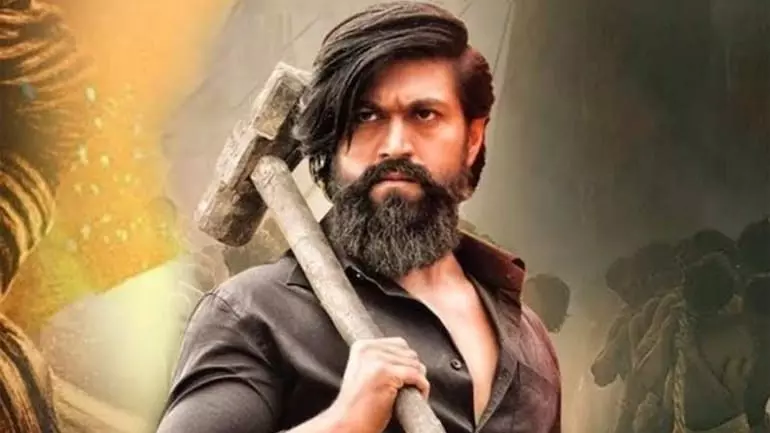
KGF/Kantara effect: Sequel-prequel craze grips Kannada film industry
After the runaway success of film franchises like 'KGF' and 'Kantara', Kannada filmmakers are cashing in on sequels

Sequels and prequels seem to be the new trend in Kannada cinema, thanks mostly to the runaway success of KGF. Makers of Kannada industry's most successful film Kantara are all set to shoot its prequel, reportedly planned on a budget of ₹125 crore. The prequel will be set in Mangaluru, while the first part was set in Kundapura part of Dakshina Kannada district. Rishab Shetty has recently said that he is busy finalising the script and the shooting will likely commence in mid-November. The film is planning for an early 2024 release.
The third part of the KGF franchise
Meanwhile, the film industry is also watching with bated breath how the KGF franchise starring Yash, produced by Hombale Films, is continuing to extend its universe. Sources say the makers are engaged in prepping for KGF-3. The success of KGF Part I and II has emboldened them to extend the journey further to Part III. After KGF-2 ended with the hint of the third part, fans of Kannada star Yash, are eagerly waiting. The producers are planning to release the film mid-2025.
Kabzaa-2
R Chandru, director of Kabzaa, starring Upendra, Shivarajkumar, Sudeep and Shriya Saran, is reportedly busy scripting Kabzaa-2. Tothapuri-Chapter 2, starring Jaggesh, was released on September 2023. It is an entertaining sequel to the movie Tothapuri Chapter-1. The film is written and directed by Vijay Prasad.
Nutan Umesh, maker of Fighter-1 starring Vinod Prabhakar, recently hinted that Fighter-2 is on the anvil.
Side A and Side B concept
Noted filmmaker Hemanth M Rao experimented with a sequel format through Side-A and Side-B formula in his Sapta Saagaradaache Ello (meaning Somewhere Beyond The Seven Oceans). Side A, the first part of this film, received rave reviews and was appreciated by critics. Though the film received a mixed reaction at the box office, makers are all set to release Sapta Saagaradaache Ello - Side B.
To be concluded...
However, some films needlessly stretch their plot to get a part 2. Noted film critic Chetan Nadiger gave examples of releases such as Nam Nani Maduve Prasanga directed by Hemanth Hegde, Raghavendra Rajkumar starrer 13-Part I directed by K Narendra Babu. According to the critic, these films did not even offer a logical end. Instead, the director advised the audience to watch its sequel with the curtains going down on the line “to be concluded”.
“No one knows whether the franchise will make its sequel or not. After watching the first part, the audience is at a loss to understand what the filmmaker wanted to communicate and what he will offer in the sequel," notes Nadiger.
“The audience is confused and fails to understand the purpose of making sequels for these films,” says Chetan Nadig. For example, there was no need for making Part 2 of Thothapuri as the film did not have anything to offer to the audience, except double entendre, he points out.
Sequels, not a new phenomenon
Sequels are not a new phenomenon in Kannada cinema though. The success of Sangliyana, directed by K V Raju and released in 1988, paved the way for a sequel. The film named after an upright cop, Sangliyana, was about dealing with corruption in society. Its sequel was released in 1990.
Similarly, Golmal Radhakrishna, starring Ananth Nag, saw its sequel in 1991. “Where there is a successful film, there is bound to be a sequel. In their attempt to recreate the magic as it were, makers of the original seem to be all in favour of working with the same thing yet again,” observes B N Subrahamanya, Kannada film writer, a National award WINNER.
He cites sequels of Mungaru Male, which changed the dynamics of Kannada cinema in 2006 and Aptamitra starring Vishnuvardhan, Deadly Soma, Upendra, Dandupalya, Galipata among others. There was also Kendasampige by Suri, which resulted in Popcorn Monkey Tiger.
According to Subrahamanya, the Kannada film industry, which has found its feet again, is trying to cash in on its revival with these sequels and prequels. It is a fact that the makers of KGF and Kantara did not have an inkling they would end up making sequels on the lines of Bahubali and Ponniyan Selvan. When KGF was planned, its scope was limited. But, as Shooting progressed, understanding the scope and considering the growing craze, the makers decided to release the films in two parts.
Even Kantara’s prequel is the result of an overwhelming response both in India and abroad. Significantly, the makers did a lot of preparation to narrate the story and shot the film accordingly to meet the growing demand and taste of the audience. That’s why Kantara succeeded in appealing to both class and mass. “But, this cannot be said about other films, which have sequels," says Nadiger.
A senior filmmaker, who chose to remain anonymous, says: “Sequels are a tricky proposition for filmmakers. Besides serving something new to the audience, they must retain the first part's essential charm. Sequels demand a certain degree of honesty and integrity. Makers should be responsible enough. The film sequel has been much maligned in popular culture in the West. It is a corporate exercise, which is being done with an eye on profits and ends up being a regurgitation of the narrative.”

